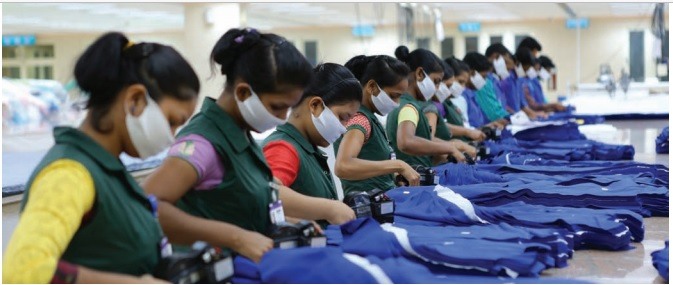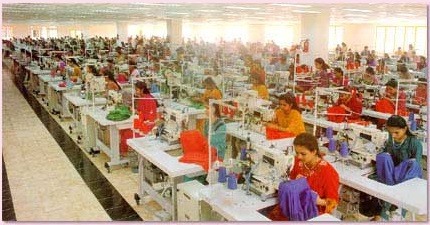From 1960’s different political parties that ruled the state often used the industrialists as scape goat to hide their failures… Alappuzha which was a bustling port town and a hub of coir industry in Kerala now resembles a ghost town. The port ceased operations decades ago. A large number of industrialists in the coir sector has relocated to Tamil Nadu. Even the coconut oil traders from the town have relocated to Tamil Nadu.
PRAVASISAMWAD.COM
A few months after it was extolled by international and national media for Covid management, Kerala is back in the news, but this time for a wrong reason. The decision of Kitex group, an industrial major based in the state, to roll back a promised investment of Rs 3500 crore in the state and invest it in Telengana has fuelled critical reviews about the hostile investment climate in the state and brought tons of adverse media publicity to the state’s left government.
The Kochi based company says its decision follows witch-hunting and unrelenting harassment by the Left government, without any apparent reason. The immediate reason that irked the government could be the formation of a political party by Kitex managing director Sabu Jacob. However, that isn’t the only reason for harassing Kitex. Persecuting businessmen is part of the work culture of a section of bureaucrats and the perspective of many politicians in Kerala. The popular Malayalam word for trader, ‘Kachavadakkaran’ is also used as a synonym for wheeler-dealer.
Incidents of witch-hunting investors after face-off with political leaders are common in Kerala, and many such incidents have been reported from across the state in the recent past. Here are two such incidents that stand out: A Gulf returned small scale industrialist, Sugathan, who started a workshop at Vilakkudi in Kollam, committed suicide reportedly after local CPI leaders harassed him. Similarly, at Anthoor town in Kannur, a businessman Sajan Parayil, who toiled in Nigeria for years and invested in Anthoor, committed suicide after alleged harassment by CPM leaders. Reports said both were pressurised by political leaders and bureaucrats for bribes in return for granting licenses for their business.

Following the flight of Kitex, media are rife with reports of high unemployment, hostile investor climate, militant trade unionism and bureaucratic bottlenecks in the state. The acclaimed Kerala Model Development now finds itself under the scanner. However, the most important factor that works against businesses in Kerala is the ubiquitous and decentralised corruption, which is often missed by the critics.
The left defence
Finding his government reeling under adverse publicity, the state Chief Minister Pinarayi Vijayan is leading the fight back, flaying the allegations of Kitex as mala fide and the outcome of a conspiracy to malign the state. He cited the Sustainable Development Goals Indiex (SDGI) of NITI Ayog – where Kerala is ranked first – to score brownie points. While the Chief Minister has tried to debunk the charges of Kitex, and portrayed it as a one-off incident, he conveniently chose to turn a blind eye towards the fact that around 20,000 small businesses in the state have shut down after the first wave of Covid.
Following the flight of Kitex, media are rife with reports of high unemployment, hostile investor climate, militant trade unionism and bureaucratic bottlenecks in the state. The acclaimed Kerala Model Development now finds itself under the scanner. However, the most important factor that works against businesses in Kerala is the ubiquitous and decentralised corruption, which is often missed by the critics.
Meanwhile, in a desperate bid to save the skin, the state industries minister P Rajeev warned Kitex not to discredit Kerala. While many feel the minister’s effort to incite regional pride by portraying criticism against the left as criticism of Kerala is a tactic, he got unexpected support from the opposition Congress. Its leaders, except Shashi Tharoor MP, have come out in support of the government. As many people are now speaking out about the industrial climate of the state, it warrants a detailed discussion.
What growth rankings miss
While the Chief Minister’s claim that Kerala is ranked first among Indian states in the SDGI ranking of the NITI Ayog is true, it needs to be compared with the state’s rankings on industrial friendliness and unemployment. Kerala is ranked 28 among the Indian states in the Ease of Doing Business Index (2019) prepared by the Department for Promotion of Industry and Internal Trade (DPIIT). According to a survey of Centre for Monitoring Indian Economy (CMIE), released in May 2020, Kerala’s unemployment rate was 26.5, per cent which is 3 per cent higher than the national average unemployment rate of
23.5 per cent.

It’s a paradox, but a fact that despite high unemployment, Kerala is ranked higher than North Indian states in Human Development Index (HDI). The HDI is based on factors like performance in health and education, accessibility to potable water, power, gender equality etc. When the unemployed have little spending capacity, how could they access quality education, healthcare, drinking water, power etc. ?. Is Kerala a welfare state where the government provides services free of cost? Absolutely not. Then what is the secret of the relatively high standard of life in the state? The answer is the remittances sent by the Malayali diaspora, esp those in the Gulf countries.
It means a section of Malayalis sacrifice their lives in the far off countries – esp the Gulf countries – to provide a decent life to those who sit back at home and faff around. The claims of the left intelligentsia that the left movement has ensured high living standards and inclusive development are humbug. Rankings like HDI and SDGI assess the performance on various fronts but rarely go deep into the factors that make it possible. The rankings don’t bother if those achievements propped up by the remittances are sustainable in case the remittances from the Gulf dry up. To sum up, misusing rankings to establish that Kerala is comparable to developed countries is Zohnerism (ie. Use of facts to mislead ignorant public to a false conclusion).
Another claim of the left that needs to be exposed is, it is the high quality education provided by the state that enables youth to find jobs in foreign lands. Majority of Keralites who work in Gulf countries are not highly educated, working in top posts. A large number of the Kerala diaspora are employed in jobs like salesmen, clerks, nursers , accountants etc which fetch them small to medium salaries. Kerala doesn’t have many to flaunt like Google CEO Sundar Pichai, Pepsi CEO Indra Nooyi or Satya Nadella, CEO of Microsoft, who are all from the neighbouring states.
Investments in Kerala and the flight of capital
Few major industries have started in the state after it was formed. The much-abused and politically hated Diwan of erstwhile Travancore Sir C.P Ramaswamy Iyer had started more industries in the state than all the democratically elected governments led by the Congress or the CPI (M). The major industries in Kerala like Fertilizers and Chemicals Travancore (FACT), Punalur Paper Mills, Travancore Cements Kottayam, Travancore Rayons, Kundara Aluminium and Titanium dioxide plant were all founded at the initiative of Sir C.P.
From 1960’s the different political parties that ruled the state often used the industrialists as scape goat to hide their failures. The umpteen strikes organised by political parties in the state in the coir and the cashew sector, which form the backbone of traditional industries in the state forced them to relocate. Alappuzha which was a bustling port town and a hub of coir industry in Kerala now resembles a ghost town. The port ceased operations decades ago. A large number of industrialists in the coir sector has relocated to Tamil Nadu. Even the coconut oil traders from the town have relocated to Tamil Nadu.

Similarly, Kollam, once the capital of world’s cashew industry (the native town of Rajan Pillai, the former owner of Britannia industries) can no more claim the status. Many industrialists from Kollam have migrated to Tamil Nadu, Andhra Pradesh and even African countries. The recalcitrant attitude of trade union leaders in Kerala against mechanisation and modernisation are among the major reasons that forced businessmen to go for investor-friendly neighbouring states.
Job opportunities and the government
Rampant unemployment leads to social unrest in all parts of the world against ruling governments, but not in Kerala. The quintessential Keralite doesn’t believe that it is the responsibility of the government to attract investors to provide jobs to the people. Subjected to systematic brainwashing by the left groups, the Keralite thinks it’s the norm to go to other states or foreign lands and find a job there. Parents and relatives expect expatriate youth to send remittances in return to the education provided to them. They lavishly spend money sent by expatriates who toil in foreign lands and yap away about socialism while enjoying a cushy life at home.
This concept works well in Kerala because of the political system in Gulf countries, where only very few expatriates get citizenship. This forces expatriates to repatriate money to their home as they cannot settle in the Gulf. However, the pattern of migration from Kerala is now changing and the youth opt Europe, Australia and Americas where they get citizenship. They are unlikely to send huge money back home like their forefathers who went to Gulf, and Kerala is likely to feel the heat soon.
Way out
Is there a way out for Kerala? Yes there is. Keralites should realise that they cannot depend on Gulf forever. The state should attract industries and retain them. The rampant corruption and cronyism in Kerala should be replaced by professionalism. But it is tough and calls for overarching changes in politics and society. The perspective of life driven by hype and hoopla about Kerala as the numero uno should give way for hard work. Those who work hard should be given good working conditions and salary. There should be ample opportunities.


